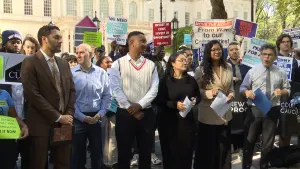More Stories
New York City residents may soon see a hike in rent prices after the Rent Guidelines Board cast its preliminary vote in favor of increasing rent.
The assessed cost increases from the board recommend between a 2.7% and 4.5% hike for one-year leases and between 4.3% and 6% for two-year deals, which would impact rent-stabilized apartments, lofts and hotels.
While Thursday night's vote on increase proposals from the members of the Rent Guidelines Board is only preliminary, it is often an indicator of what to expect from the results of the final vote.
Various organizations have spoken out against the proposed increases since their release last month, calling the possible adjustments unfair for tenants struggling to pay for already expensive rent.
Comptroller Brad Lander offered a strong critique of the board's Income and Affordability Report after its release.
"Unfortunately, the Rent Guideline Board staff proposal missed the mark," Lander said in a statement. "Potential rent increases as high as 9 percent on two-year leases are far beyond what many rent-stabilized tenants can possibly afford, while the city's housing courts are slammed with 200,000 pending eviction cases and market-rate rents in many neighborhoods are spiking to their highest levels ever."
Meanwhile, the Legal Aid Society continues to call for a freeze on all rent increases in the city, saying that the increase will be impacting some of the city's most vulnerable populations.
"Over 1 million people reside in a rent-stabilized dwelling – including many of our clients who are low-income and predominantly from Black and Latinx communities – and any increase that would siphon away money for groceries, medical care or other essentials to pad landlords' pockets is both unconscionable and immoral," The Legal Aid Society said in a statement.
But the Rent Stabilization Association, which represents 25,000 owners and managers of 1 million rent-stabilized apartments throughout the boroughs, is in favor of the increase, calling it a "starting point for owners to recover from 8 years of rent freezes and inadequate deadlines" in a statement.
"When rents were not required to be paid during the pandemic, there were no equal moratoria on property tax and water bills, or heating and other major daily operating expenses," Rent Stabilization Association vice president of communications Vito Signorile said during a previous testimony at a board hearing.'
The board's final vote will take place in June.
More from News 12
2:34

Guide: Safety tips to help prevent home burglaries
2:19

Guide: Safety measures to help prevent fires and how to escape one
2:40

Mayor's budget cuts: A controversial solution amidst immigration crisis
2:07

Tips on how to avoid confrontation with sharks while swimming in the ocean
2:33

5 tips to prevent mosquito bites and getting sick from viruses
2:39
